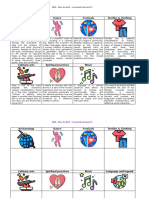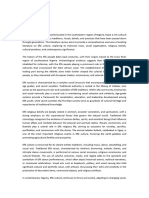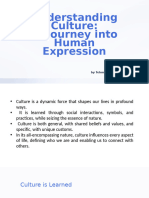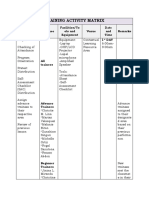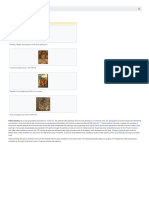The Kikuyu People
The Kikuyu People
Uploaded by
surhelixCopyright:
Available Formats
The Kikuyu People
The Kikuyu People
Uploaded by
surhelixOriginal Title
Copyright
Available Formats
Share this document
Did you find this document useful?
Is this content inappropriate?
Copyright:
Available Formats
The Kikuyu People
The Kikuyu People
Uploaded by
surhelixCopyright:
Available Formats
RICH in OUR CULTURE
The Kikuyu people, the largest ethnic group in Kenya, boast a vibrant and intricate
culture that has significantly shaped the social and historical landscape of the nation.
Rooted in centuries-old traditions, the richness of Kikuyu culture is evident in their
language, social structures, rituals, and artistic expressions. This essay explores the
depth of Kikuyu culture, highlighting its key aspects and enduring legacy.
Language and Oral Tradition
At the heart of Kikuyu culture is the Kikuyu language, Gikuyu, which is part of the
Bantu language family. Language is a vital cultural repository, preserving the
Kikuyu's history, beliefs, and values. The oral tradition is particularly significant, with
stories, proverbs, and songs passed down through generations. These oral narratives
are not just entertainment; they are educational tools, imparting moral lessons and
preserving communal knowledge.
Social Structure and Governance
Traditional Kikuyu society is organized into clans, each associated with a specific
totem animal. This clan system fosters a strong sense of identity and belonging.
Governance is traditionally managed by a council of elders, known as the Kiama.
These elders are custodians of the community’s customs and are responsible for
maintaining social order, settling disputes, and performing rituals. The age-grade
system, where individuals move through different social roles as they age, is another
key aspect, ensuring that each person contributes to and benefits from the community
at different stages of life.
Agricultural Practices
The Kikuyu are traditionally agrarian, and their farming practices are a cornerstone of
their culture. They primarily cultivate crops such as maize, beans, and sweet potatoes,
with a deep knowledge of their land and seasons. Farming is not just an economic
activity but a cultural one, tied to rituals and community cooperation. Land is
considered sacred, and practices around it are deeply respectful, emphasizing
sustainability and stewardship.
Rituals and Ceremonies
Rituals play a central role in Kikuyu life, marking important life stages such as birth,
initiation, marriage, and death. One of the most significant rituals is the initiation
ceremony, which includes circumcision for boys and clitoridectomy for girls, marking
the transition from childhood to adulthood. These ceremonies are elaborate, involving
songs, dances, and feasts, and are crucial for the social integration of individuals into
the community.
Religion and Beliefs
The Kikuyu’s spiritual beliefs are deeply interwoven with their daily lives. They
traditionally worship Ngai, the supreme God, who is believed to reside on Mount
Kenya (Kirinyaga). Ancestral spirits, or 'Mwene Nyaga,' are also venerated, and
rituals are performed to honor them and seek their guidance. These religious practices
underscore a worldview that sees the sacred in everyday life and emphasizes harmony
with nature and respect for the ancestors.
RICH in OUR CULTURE
Art and Music
Kikuyu art and music are vibrant expressions of their cultural identity. Traditional
music, characterized by rhythmic drumming, chanting, and singing, is an integral part
of ceremonies and communal gatherings. Instruments such as the wandindi (a stringed
instrument) and the gicandi (a rattle) are commonly used. Kikuyu visual art includes
intricate beadwork, basketry, and pottery, often imbued with symbolic meanings and
used in various cultural practices.
Adaptation and Modernity
While the Kikuyu have retained much of their traditional culture, they have also
adapted to modern influences. Christianity, introduced by missionaries in the 19th
century, has been widely adopted, often blending with traditional beliefs in a syncretic
fashion. Education and economic changes have also transformed aspects of Kikuyu
life, yet the core values of community, respect for elders, and connection to the land
remain strong.
Conclusion
The richness of Kikuyu culture lies in its depth, adaptability, and the strong sense of
identity it fosters among its people. From language and governance to rituals and art,
every aspect of Kikuyu culture is a testament to their resilience and creativity. As
Kenya continues to develop, the Kikuyu community's commitment to preserving their
cultural heritage while embracing modernity offers a valuable model of cultural
sustainability and continuity.
You might also like
- Introduction To The Guest SpeakerDocument2 pagesIntroduction To The Guest SpeakerLeodigaria Reyno95% (75)
- Culture Differences of China and PhilippinesDocument2 pagesCulture Differences of China and PhilippinesPrincess Marie Juan100% (3)
- Mca Vocab Chart GR 3-8mathDocument4 pagesMca Vocab Chart GR 3-8mathapi-294805158No ratings yet
- Module I Nature and Scope of Research MethodologyDocument6 pagesModule I Nature and Scope of Research MethodologyKhushbu Saxena100% (2)
- Project Report - Employee Job SatisfactionDocument55 pagesProject Report - Employee Job SatisfactionManish Singh100% (2)
- Contenido April Third GradeDocument7 pagesContenido April Third GradeRocio Vargas AvilaNo ratings yet
- The Rich Tapestry of Tribal CultureDocument6 pagesThe Rich Tapestry of Tribal Culturemrinalsimp1384No ratings yet
- Echoes of the Ancestors: An Exploration of Igbo Mythology: An Exploration of World Mythology, #2From EverandEchoes of the Ancestors: An Exploration of Igbo Mythology: An Exploration of World Mythology, #2No ratings yet
- PPC - Prelim ExamDocument1 pagePPC - Prelim Examathena leila bordanNo ratings yet
- Ronald PrecolonialDocument9 pagesRonald PrecolonialTugume ApolloNo ratings yet
- Project Chapter 2Document5 pagesProject Chapter 2akibaemmanuel68No ratings yet
- CultureDocument10 pagesCultureJamal AhmadNo ratings yet
- Kenyan culture-WPS OfficeDocument4 pagesKenyan culture-WPS OfficeJack MayaNo ratings yet
- Cultural IdentityDocument2 pagesCultural Identityleeffint2021No ratings yet
- Diversity Among Nations New Zealand and Papua New GuineaDocument8 pagesDiversity Among Nations New Zealand and Papua New GuineaVillarin Almera O.No ratings yet
- Full Name of The StudentDocument2 pagesFull Name of The Studentleeffint2021No ratings yet
- The History and Culture of Indigenous People in North AmericaDocument3 pagesThe History and Culture of Indigenous People in North AmericaYouNo ratings yet
- Moro MinsupalaDocument16 pagesMoro MinsupalaCarlina FerreraNo ratings yet
- Alaska StudiesDocument2 pagesAlaska Studiesleeffint2021No ratings yet
- Research About Cultural Performances in Philippines 1Document7 pagesResearch About Cultural Performances in Philippines 1leekoodelimNo ratings yet
- A HISTORY OF AGBO-REMIREKE FESTIVAL IN AGBOWA-IKOSI, LAGOS STATE (Chapter 1)Document19 pagesA HISTORY OF AGBO-REMIREKE FESTIVAL IN AGBOWA-IKOSI, LAGOS STATE (Chapter 1)Abdullahi FatimahNo ratings yet
- Embracing The Rich Cultural Heritage of BorneoDocument2 pagesEmbracing The Rich Cultural Heritage of Borneowiandra.reservationNo ratings yet
- Characteristics OFcultureDocument10 pagesCharacteristics OFcultureJamal AhmadNo ratings yet
- CukltureDocument2 pagesCukltureleeffint2021No ratings yet
- CORDILLERADocument35 pagesCORDILLERAAngilyn LagaticNo ratings yet
- Wa0021.Document4 pagesWa0021.linneth armentaNo ratings yet
- KalingaDocument5 pagesKalingaClanesiaNo ratings yet
- Activity No. 1Document3 pagesActivity No. 1Marygwen TarayNo ratings yet
- Bontoc and Isnag 1Document2 pagesBontoc and Isnag 1Nichole BenbenenNo ratings yet
- MUSLIMDocument11 pagesMUSLIMMariahNo ratings yet
- Echoes of the Past: An Exploration of Bai Mythology: An Exploration of World Mythology, #4From EverandEchoes of the Past: An Exploration of Bai Mythology: An Exploration of World Mythology, #4No ratings yet
- Lecture Note Nigerian HeritageDocument22 pagesLecture Note Nigerian Heritagebakom3325No ratings yet
- Cultural DiversityDocument13 pagesCultural Diversityestheronkabetse2No ratings yet
- People's Way of Life Is Commonly Referred To As Culture.Document14 pagesPeople's Way of Life Is Commonly Referred To As Culture.Jhoy Valerie Foy-awonNo ratings yet
- ALBA SANGIL TRIBE FinalDocument15 pagesALBA SANGIL TRIBE FinalRITCHELL ANN DEMAVIVAS GABOT100% (1)
- Republic of The PhilippinesDocument1 pageRepublic of The PhilippinesBranden Mark Salvio BlanzaNo ratings yet
- Anthropology Q1Document14 pagesAnthropology Q1ugacanchristine205No ratings yet
- Group 1Document9 pagesGroup 1Erika RodriguezNo ratings yet
- ECONOMIC ANTHROPOLOGY ASSIGNMENT Write On The Organization of and InvestmentDocument4 pagesECONOMIC ANTHROPOLOGY ASSIGNMENT Write On The Organization of and Investmentstevenstefan2019No ratings yet
- Cuyunon PeopleDocument6 pagesCuyunon PeopleKristel BelgicaNo ratings yet
- Ethnography Paper About Fiesta in The PhilippinesDocument6 pagesEthnography Paper About Fiesta in The PhilippinesjustinesenovesoNo ratings yet
- GR 7 CP-2 LE-1 Intro To Cultural Diversity in BangladeshDocument16 pagesGR 7 CP-2 LE-1 Intro To Cultural Diversity in BangladeshFatima KabirNo ratings yet
- Josephine Assignment MainDocument10 pagesJosephine Assignment MainXclusiveprinting PressNo ratings yet
- Cook Islands - Personality and CultureDocument13 pagesCook Islands - Personality and CultureSándor Tóth100% (1)
- KTN and NTV Kenyan Music Mix Shows.20121012.233944Document2 pagesKTN and NTV Kenyan Music Mix Shows.20121012.233944anon_804947007No ratings yet
- A Collection of 100 Tugen Proverbs and Wise SayingsDocument49 pagesA Collection of 100 Tugen Proverbs and Wise Sayingskosgey davidNo ratings yet
- Reflection Paper - Secular & Non-Secular FestivalsDocument3 pagesReflection Paper - Secular & Non-Secular FestivalsreginmaedNo ratings yet
- Cultural Festivities in Nigeria As A TooDocument11 pagesCultural Festivities in Nigeria As A TooAdeyemi OluwapelumiNo ratings yet
- Brief Meaning of Folk CultureDocument1 pageBrief Meaning of Folk CultureCollins ManalaysayNo ratings yet
- ESSAY putridyahKKL CompressedDocument8 pagesESSAY putridyahKKL Compressed1dpgsdunivet21No ratings yet
- Filipino Cultural HeritageDocument14 pagesFilipino Cultural HeritageMia Grace Edaño Rosellosa100% (1)
- Murillo Comprehensive Paper It3r8Document6 pagesMurillo Comprehensive Paper It3r8murillojuancarlos499No ratings yet
- Phil HistoryDocument29 pagesPhil HistoryJay SolivenNo ratings yet
- Religions & Beliefs in China: ConfuciansmDocument7 pagesReligions & Beliefs in China: ConfuciansmAngeloNo ratings yet
- Exploring The Rich Cultural Heritage and Traditions of IrosinDocument4 pagesExploring The Rich Cultural Heritage and Traditions of Irosinderyrainer3No ratings yet
- What Is Culture CLT Communicative Language Teaching Resources Conv - 133812Document9 pagesWhat Is Culture CLT Communicative Language Teaching Resources Conv - 133812María Jesús Clavijo BarraNo ratings yet
- Cultural Activities and Festivals in Rural LifeDocument8 pagesCultural Activities and Festivals in Rural Lifeprismamedia.inNo ratings yet
- From Indigenous To ContemporaryDocument16 pagesFrom Indigenous To ContemporaryIfeoluwa OlorunsogoNo ratings yet
- Group7 TheoUCSP PTDocument10 pagesGroup7 TheoUCSP PTg.mangelin21No ratings yet
- Cultures Traditions of CebuDocument8 pagesCultures Traditions of CebuRichee CletNo ratings yet
- Gist of Kurukshetra June 2024Document12 pagesGist of Kurukshetra June 2024anmol27febNo ratings yet
- June 2024Document16 pagesJune 2024akankshabhardwaj111No ratings yet
- Pre ReadingDocument14 pagesPre Readingellamaecalamucha8No ratings yet
- Call For Applications - GENOMICS - A.Y. 2023-24Document19 pagesCall For Applications - GENOMICS - A.Y. 2023-24khanshazad2381No ratings yet
- The Discrimination ModelDocument16 pagesThe Discrimination ModelSiti MuslihaNo ratings yet
- Computer Assisted Language Learning Jeisson Nicolas Rozo Informatica EducativaDocument3 pagesComputer Assisted Language Learning Jeisson Nicolas Rozo Informatica EducativanicolasrozoNo ratings yet
- 9th NAO Senior First Round Result - 15may2022Document3 pages9th NAO Senior First Round Result - 15may2022Prajwal DasNo ratings yet
- Unit 1 Speaking Test Unit 3 Speaking Test: Project 1 Skills TestsDocument3 pagesUnit 1 Speaking Test Unit 3 Speaking Test: Project 1 Skills TestsMirabela AdumitraceseiNo ratings yet
- Training Activity MatrixDocument10 pagesTraining Activity MatrixSara Jane SumngatNo ratings yet
- Revised ELLE ManualDocument56 pagesRevised ELLE Manualsanathjayasekara85No ratings yet
- Effect of Expressive Writing On The Subjective Well-Being of UnivDocument10 pagesEffect of Expressive Writing On The Subjective Well-Being of Univjamilasampang4No ratings yet
- The Supervisory Relationship Questionnaire (SRQ)Document3 pagesThe Supervisory Relationship Questionnaire (SRQ)kartuteNo ratings yet
- UT Dallas Syllabus For Rhet1101.031.07f Taught by Sherry Marek (Sherrys)Document6 pagesUT Dallas Syllabus For Rhet1101.031.07f Taught by Sherry Marek (Sherrys)UT Dallas Provost's Technology GroupNo ratings yet
- Research Paper MidtermDocument3 pagesResearch Paper MidtermCabildo, Neil Andrei T.No ratings yet
- Ips 331 Class NotesDocument5 pagesIps 331 Class NotesAnathi ManyabaNo ratings yet
- Kristin Domestic Fee Schedule 2024Document1 pageKristin Domestic Fee Schedule 2024Smile PrincessNo ratings yet
- Aptitude Made Simple: Numbers - Divisibility TestDocument17 pagesAptitude Made Simple: Numbers - Divisibility TestJoey saravanaNo ratings yet
- HISW 202 SyllabusDocument9 pagesHISW 202 SyllabusIqbal SanduNo ratings yet
- Ykt 114 - Communications Theory - Course OutlineDocument10 pagesYkt 114 - Communications Theory - Course Outlinemei chee punNo ratings yet
- Lesson 9 - KeyDocument7 pagesLesson 9 - Keyduc anh NguyenNo ratings yet
- Indian PaintingDocument9 pagesIndian PaintingxiaoboshiNo ratings yet
- Instructional MaterialsDocument6 pagesInstructional Materialschel llorenNo ratings yet
- Administration of Unified Numeracy TestDocument25 pagesAdministration of Unified Numeracy TestGirlie Ann A MarquezNo ratings yet
- Miz Katz Ratz N.: Alphabetti Book 1-ADocument11 pagesMiz Katz Ratz N.: Alphabetti Book 1-Afala_fadilah4966No ratings yet
- New Microsoft Office Word DocumentDocument5 pagesNew Microsoft Office Word DocumentJOYDEEP DASGUPTANo ratings yet
- 2010 I PSLEExam TimetableDocument1 page2010 I PSLEExam Timetablejingwei222No ratings yet
- L and T Resume PDFDocument1 pageL and T Resume PDFIndra KeshNo ratings yet
- Honours in Social Welfare IQACDocument162 pagesHonours in Social Welfare IQACsksohan500gamil.comNo ratings yet
- 8 Essential Skills For The IELTS ExamDocument11 pages8 Essential Skills For The IELTS ExamSarah AngoNo ratings yet





